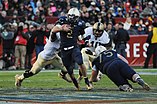
Back الرياضة في الولايات المتحدة Arabic ABŞ-də idman Azerbaijani Sport ve Spojených státech amerických Czech Sport in den Vereinigten Staaten German Deporte en los Estados Unidos Spanish ورزش در آمریکا Persian Yhdysvaltain urheilu Finnish Sport aux États-Unis French アメリカ合衆国のスポーツ Japanese 미국의 스포츠 Korean
| This article is part of a series on the |
| Culture of the United States |
|---|
 |
| Society |
| Arts and literature |
| Other |
| Symbols |
|
United States portal |
Sports in the United States are an important part of the nation's culture. Historically, the most popular sport has been baseball. However, in more recent decades, American football has been the most popular spectator sport based on broadcast viewership audience. Basketball has grown into the mainstream American sports scene since the 1980s, with ice hockey and soccer doing the same around the turn of the 21st century. These sports comprise the "Big Five".
In the first half of the 20th century, boxing and collegiate football were among the most popular sports after baseball. Golf, tennis, and collegiate basketball are other spectator sports with longstanding popularity. Tennis is currently considered to be the sixth most popular sport in the United States.[1] Most recently, mixed martial arts has been breaking records in attendance and broadcast viewership for all combat sports.
Based on revenue, the major professional sports leagues in the United States and Canada are the National Football League (NFL), Major League Baseball (MLB), the National Basketball Association (NBA), the National Hockey League (NHL), and Major League Soccer (MLS). At $16 billion in revenue, the NFL is the largest league in the world.[2]
The market for professional sports in the United States is about $69 billion, roughly 50% larger than that of all of Europe, the Middle East, and Africa combined.[3] All these leagues enjoy wide-ranging domestic media coverage and, except for Major League Soccer, all are considered the preeminent leagues in their respective sports in the world. Although American football does not have a substantial following in other nations, the NFL does have the highest average attendance (67,254) of any professional sports league in the world. MLB has the second highest average attendance of any sports league in the U.S. (29,293)[4] followed by MLS, the NBA, and the NHL. Of these five U.S.-based leagues, all but the NFL have at least one team in Canada.
Professional teams in all major sports in the United States operate as franchises within a league, meaning that a team may move to a different city if the team's owners believe there would be a financial benefit, but franchise moves are usually subject to some form of league-level approval.[5] All major sports leagues use a similar type of regular-season schedule with a post-season playoff tournament. In addition to the major league–level organizations, several sports also have professional minor leagues, active in smaller cities across the country.
As in Canada and Australia, sports leagues in the United States do not practice promotion and relegation, unlike most sports leagues in Europe. Another notable distinction is that most sports fans in the United States tend to follow more than one team sport, depending on the time of year, unlike the case in many parts of the world where fans might avidly follow only one team sport such as soccer or baseball. Thus, it is possible for a U.S. sports fan who follows multiple sports to spend practically every single day of the year watching professional sports, since there is no time of year when all the Big Five leagues would be off-season.
Sports are particularly associated with education in the United States, with most high schools and universities having organized sports, and this is a unique sporting footprint for the U.S. College sports competitions play an important role in the American sporting culture, and college basketball and college football are more popular than professional sports in some parts of the country. The major sanctioning body for college sports is the National Collegiate Athletic Association (NCAA). Colleges collectively receive billions of dollars from TV deals, sponsorships, and ticket sales. In 2019, the total revenue generated by NCAA athletic departments added up to $18.9 billion.[6]
Based on Olympic Games, World Championships, and other major competitions in respective sports, the United States is the most successful nation in the world in baseball, basketball, athletics, swimming, lacrosse, beach volleyball, figure skating, tennis, golf, boxing, diving, shooting, rowing and snowboarding, and is all time one of the top five most successful nations in ice hockey, wrestling, gymnastics, volleyball, speed skating, alpine skiing, bobsleigh, equestrian, sailing, cycling, weightlifting and archery, among others. This makes the United States the most successful sports nation in the world. The United States has been referred to by some as the Hegemon of World Sports.[7][8][9][10][11][12] The United States has placed first in the Summer Olympic medal table 19 times out of 30 Summer Olympics and 29 appearances. Unlike most other nations, the United States government does not provide funding for sports nor for the United States Olympic & Paralympic Committee.[13][14][15][16]
- ^ "Most Popular Sports in the United States". November 7, 2023. Retrieved March 29, 2024.
- ^ "10 Most Profitable Sports Leagues in the World". November 19, 2021.
- ^ Global sports market to hit $141 billion in 2012. Reuters. Retrieved on July 24, 2013.
- ^ "MLB average attendance 2021".
- ^ Antitrust Issues in Relocation of Professional Sports Franchises: Hearing Before the Subcommittee on Antitrust, Business Rights, and Competition of the Committee on the Judiciary, United States Senate, One Hundred Fourth Congress, First Session ... November 29, 1995. U.S. Government Printing Office. 1996. ISBN 978-0-16-053448-5.
- ^ "Infographic: U.S. College Sports Are a Billion-Dollar Game". July 2, 2021.
- ^ "Greatest Sporting Nation". Greatest Sporting Nation.
- ^ "Top Sporting Nations – Biggest Global Sports". Biggest Global Sports.
- ^ "Olympics medal table by country". Statista.
- ^ "1,000 times gold – The thousand medals of Team USA – Washington Post". The Washington Post.
- ^ "World Ranking of Countries in Elite Sport". World Sport Ranking.
- ^ "Top 10 Greatest Sports Countries". The Top Tens.
- ^ "United States Olympic & Paralympic Committee". Archived from the original on June 20, 2013.
- ^ Skousen, Mark. "Privately Funded USA Olympic Team...Wins!". Townhall.
- ^ "U.S. Has Done Fine with No Government Department of Sports". National Review. August 10, 2016.
- ^ Bachman, Rachel (April 12, 2020). "WSJ News Exclusive | U.S. Olympic Sports Groups Seek Government Aid". The Wall Street Journal.









